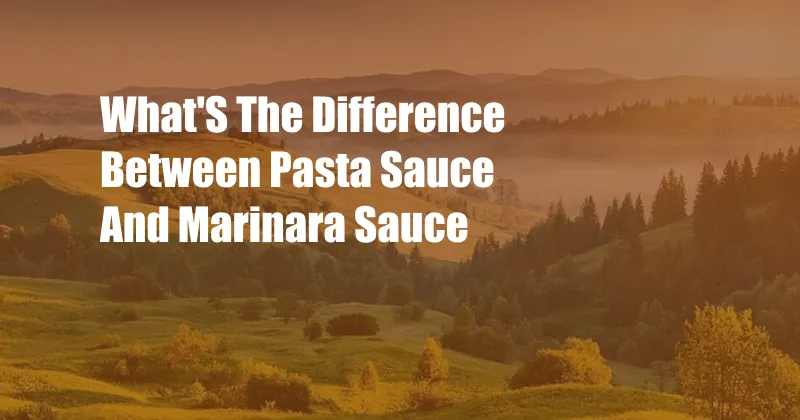
The Subtle Nuances: Unveiling the Differences Between Pasta Sauce and Marinara Sauce
In the culinary world, sauces hold a prominent place, enhancing the flavors of our beloved dishes. Among the vast array of sauces, pasta sauce and marinara sauce reign supreme, each possessing a distinct character that sets them apart.
Whether you’re a seasoned chef or a novice in the kitchen, understanding the intricacies of these sauces is paramount to creating tantalizing culinary masterpieces. In this comprehensive guide, we embark on a culinary journey, delving into the subtle nuances that differentiate pasta sauce from marinara sauce, unraveling their captivating histories, and exploring their culinary versatility.
Deciphering the Definitions: Pasta Sauce vs. Marinara Sauce
Pasta sauce, as the name suggests, is a versatile accompaniment to pasta. It forms the base of countless pasta dishes, from the hearty Bolognese to the vibrant pesto. Its composition can vary widely, incorporating tomatoes, herbs, meats, vegetables, and a plethora of other ingredients, allowing for boundless culinary creativity.
Marinara sauce, on the other hand, is a specific type of pasta sauce that traces its origins to Naples, Italy. It is characterized by its simple, yet flavorful blend of tomatoes, garlic, oregano, and basil. Traditionally, marinara sauce is prepared with fresh, ripe tomatoes, lending it a vibrant red hue and a robust, tangy flavor.
Historical Roots: A Tale of Two Sauces
The evolution of pasta sauce and marinara sauce is a culinary tale that spans centuries. Pasta sauce, in its rudimentary form, has been gracing tables since the Middle Ages. However, it was during the 19th century that pasta sauce truly flourished, gaining popularity throughout Italy and beyond.
Marinara sauce, with its Neapolitan heritage, emerged in the 18th century. It is believed to have originated among fishermen who, upon returning from their expeditions, would combine their fresh catch with tomatoes, herbs, and garlic, creating a flavorful sauce to pair with their pasta.
Culinary Versatility: Endless Possibilities
Pasta sauce and marinara sauce serve as the foundation for a myriad of culinary creations. Pasta sauce, with its boundless versatility, can be customized to suit any palate, whether you prefer a creamy Alfredo sauce, a spicy Arrabiata, or a classic tomato sauce.
Marinara sauce, while more traditional, also offers culinary flexibility. Its tangy flavor pairs harmoniously with grilled meats, seafood, and vegetables, making it an excellent choice for marinating or grilling.
Tips for Success: Mastering the Art of Sauce-Making
Elevate your pasta sauce and marinara sauce creations by incorporating these culinary tips:
- Utilize high-quality ingredients for optimal flavor. Opt for ripe tomatoes, fresh herbs, and aromatic garlic.
- Simmer the sauce over low heat to allow the flavors to meld and develop. Patience is key in achieving a delectable sauce.
- Taste and adjust seasonings as needed. A pinch of salt, a sprinkle of pepper, or a touch of acidity can enhance the sauce’s overall balance.
Expert Advice: Insights from Culinary Professionals
Renowned chefs share their wisdom on crafting exceptional pasta sauce and marinara sauce:
“The secret to a great pasta sauce lies in the quality of the tomatoes,” advises Chef Marco Pierre White. “Use the best you can find, and let their natural sweetness shine through.”
“Marinara sauce is all about simplicity and freshness,” says Chef Jamie Oliver. “Use ripe, juicy tomatoes and fresh herbs to create a vibrant, flavorful sauce.”
FAQ: Frequently Asked Questions about Pasta Sauce and Marinara Sauce
Q: What is the key difference between pasta sauce and marinara sauce?
A: Pasta sauce encompasses a wide range of sauces used with pasta, while marinara sauce is a specific type of pasta sauce characterized by its tomato, garlic, oregano, and basil base.
Q: Can I substitute marinara sauce for pasta sauce?
A: Yes, marinara sauce can be used as a substitute for pasta sauce in many dishes. However, its distinct flavor may not complement all pasta dishes equally.
Q: How can I thicken pasta sauce?
A: You can thicken pasta sauce by simmering it for an extended period, adding cornstarch or flour, or incorporating grated Parmesan cheese.
Conclusion: Embark on a Culinary Adventure
Pasta sauce and marinara sauce are culinary treasures that add depth and flavor to our culinary creations. Whether you’re a seasoned chef or a home cook eager to expand your culinary horizons, understanding the differences between these sauces empowers you to craft tantalizing dishes that will delight your taste buds.
So, dear reader, are you ready to embark on a culinary adventure that celebrates the exquisite flavors of pasta sauce and marinara sauce? Let this guide be your compass, as you navigate the world of sauces, creating unforgettable culinary masterpieces that will leave a lasting impression on your palate.